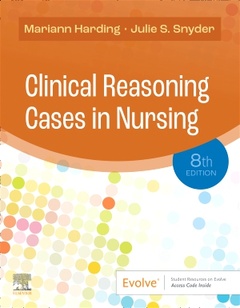Description
Clinical Reasoning Cases in Nursing (8th Ed.)
Authors: Harding Mariann M., Snyder Julie S.
Language: English
Subject for Clinical Reasoning Cases in Nursing:
68.45 €
In Print (Delivery period: 14 days).
Add to cart712 p. · 21.4x27.6 cm · Paperback
Description
/li>Contents
/li>Biography
/li>
Learn to make sound clinical nursing judgments with the concept-based, case study approach in Harding & Snyder's Clinical Reasoning Cases in Nursing, 8th Edition. Awarded second place in the 2019 AJN Book of the Year Awards in the Medical-Surgical category, this time-tested case study resource is highly regarded for its clinically relevant and thought-provoking cases. Approximately150 true-to-life case studies cover all four clinical practice areas - medical-surgical, pediatric, OB/maternity, and psychiatric-mental health nursing - all organized to facilitate a conceptual approach to teaching and learning. Each case covers a common patient problem drawn from actual clinical experiences and written by nurses who are clinical experts and includes a strong focus on interprofessional collaboration competencies. Cases include integrated content on pharmacology, nutrition, and diagnostic/laboratory tests to encourage you to think critically about all aspects of patient care. The 8th edition has been updated throughout to reflect the most current standards of clinical practice, including readiness for practice in the COVID-19 era. Also new to this edition, concepts and terminology related to the Next Generation NCLEX® Exam (NGN) are introduced in the Preface and integrated throughout to help you prepare for the new exam.
- Approximately 150 case studies draw from actual clinical experiences in medical-surgical, pediatric, OB/maternity, and psychiatric-mental health clinical areas to help you learn to think clinically, prioritize, and deliver proactive nursing care.
- UNIQUE! Concept-based organization mirrors the growing popularity of concept-based curricula and conceptual approaches to teaching and learning in nursing education.
- Clinical judgment approach helps you learn to identify changes, anticipate possible complications, and initiate therapeutic interventions.
- Progressive case complexity builds on previous learning to help you gradually develop clinical judgment skills.
- Strong QSEN safety emphasis is highlighted with an icon to communicate "caution" or "safety."
- Icons identify questions that resemble new NCLEX-RN® item types.
- Strong emphasis on sepsis and antibiotic resistance addresses the growing problem of sepsis (a recent Joint Commission "core measure") and antibiotic resistance, where appropriate.
- UNIQUE! Concepts and terminology related to the Next Generation NCLEX® Exam (NGN) are introduced in the Preface and integrated throughout to help you prepare for the new exam. All questions for the NGN are highlighted with a special icon for quick reference.
- UPDATED! Content reflects the latest evidence-based clinical practice, including national and international treatment guidelines and the latest guidelines for COVID-19 and other infectious diseases.
- NEW! Additional case studies and expanded content in key areas includes breastfeeding, obstetric emergency (umbilical cord prolapse or abruptio placentae) with emergency C-section, sickle cell pain crisis, and head/neck trauma with tracheostomy.
- Expanded pharmacology content reflects the importance of a clear understanding of drug therapy on patient safety.
- Additional illustrations and expanded use of image-related question types visually reinforce the material, while also promoting clinical utility and patient diversity in a sensitive and clinically relevant way.
- Enhanced interprofessional collaboration content emphasizes the importance of identifying opportunities for collaboration with other health professions.
These books may interest you

Strategies, Techniques, & Approaches to Critical ThinkingA Clinical Judgment Workbook for Nurses 64.01 €

LPN to RN Transitions 65.12 €


